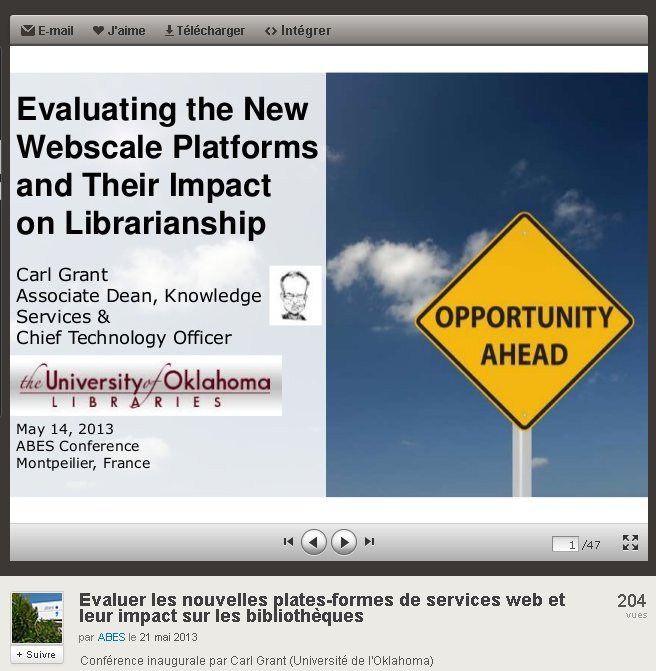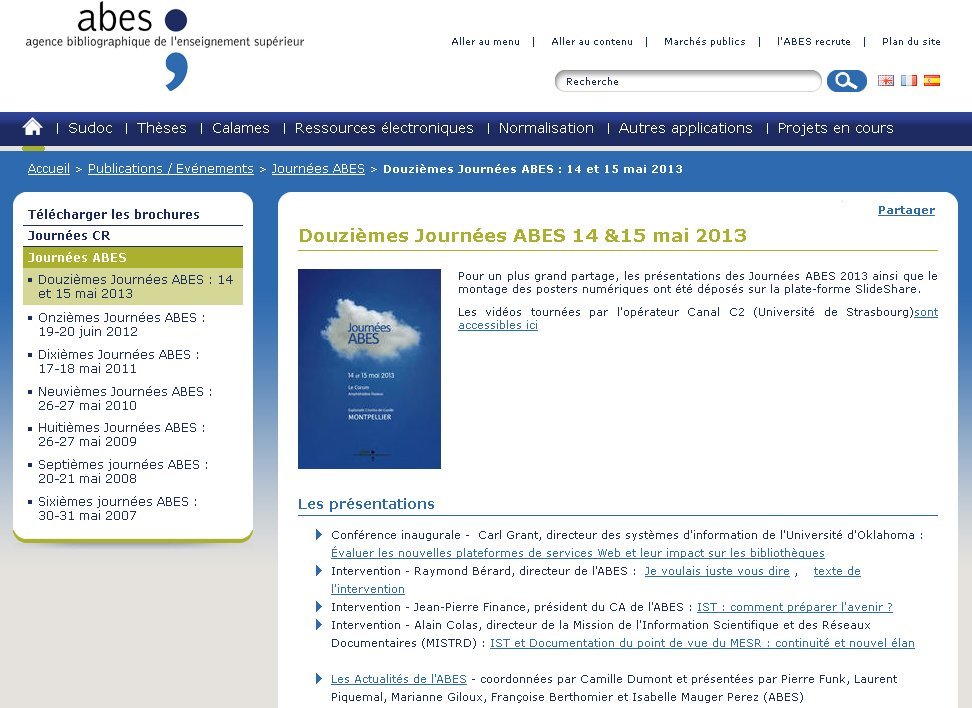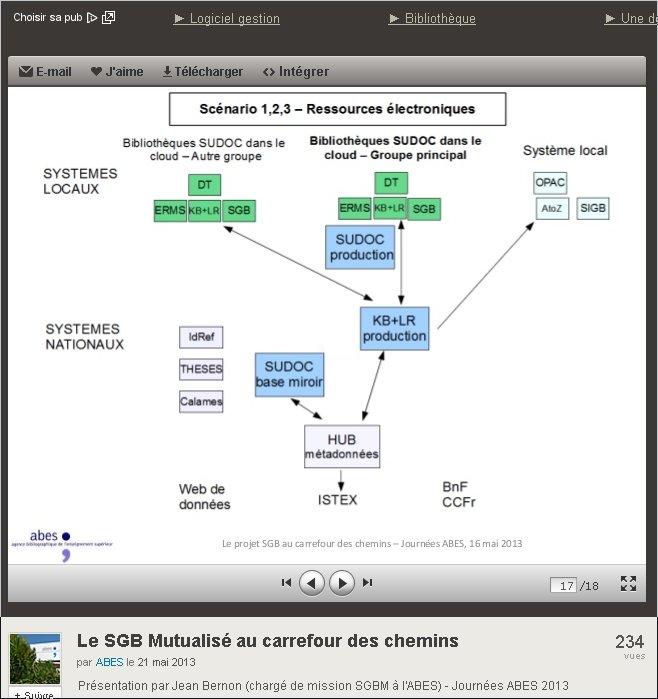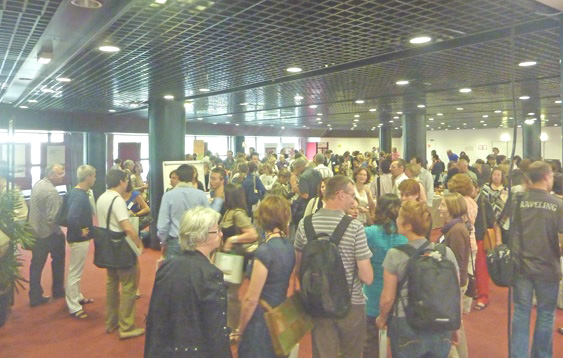JABES 2013
Marlène Delhaye reports on the two-day annual conference organised by the French Agence Bibliographique de l’Enseignement Supérieur (ABES) held in Montpellier, France over 14-15 May 2013.
In what has now become something of a tradition, the ‘Corum’ Congress Centre in Montpellier, France, hosted the twelfth in the series of the Journées de l’Agence Bibliographique de l’Enseignement Supérieur (ABES - Higher Education Bibliographic Agency) [1].
The main objectives of ABES are the development and maintainance of the shared catalogue of French academic libraries (Système Universitaire de Documentation, SUDOC) [2], the management of the theses processes and the administrative and financial support for group purchasing of e-resources for Higher Education.
Over the years, the JABES events have managed to achieve the status of indispensable rendez-vous for librarians, allowing them the opportunity to hear the experiences of international speakers, obtain news of the network, and to share their own stories with colleagues within the member libraries. For the first time, a poster session [3] was organised this year to showcase the various projects and initiatives currently in operation: it has been a definite success, with over 15 contributions presented on various themes, such as learning centres, tools for information literacy, OpenAire, usage reporting with SUSHI, enhancement of catalogue data using SUDOC tools, etc.
Moreover, the conference was broadcast live and was supplemented by a lively Twitter feed [4]. Video recordings [5] are also available.
Day One: 14 May 2013
Keynote: Evaluating the Webscale Platforms and Their Impact on Librarianship
Carl Grant, Oklahoma University Libraries
In the current context of shrinking budgets, diminishing activity and an ageing workforce, Carl exposed several challenges the profession has to face: rises in Higher Education costs, changing technologies (mobiles, Internet of things, etc), growing quantity of data to handle, wider dissemination of education with MOOCs and distance learning, even smaller attention spans. Librarians have to create new strategic spaces, offering unique value to their users. The hard part is to provide value and differentiation while remaining consistent with the original aims of the libraries – maybe it is time to think bigger: cloud computing and extensive use of APIs are key elements in enabling libraries to cope with their readers’ needs.

Cloud computing makes it possible to share data more easily (and handle bigger amounts of data): it is a first step towards the end of the silos libraries naturally tend to create, and a way to re-focus on end-users (by providing more valuable services). The new library platforms are based on cloud computing and allow us to scale up the opportunities to share.
APIs support wide collaboration between providers, librarians and users. It is no longer the content that matters anymore, it is the conversation that occurs around the content, of which the user, thanks to APIs, can play a part in creating and processing (Carl cited the example of community-created metadata by the Alma community zone from Ex Libris).
The role of libraries in this context shifts from controlling the conversation (controlled vocabularies) to facilitating it (users tagging): users want the information, but they want it their way - librarians have to have to build tools to support all forms of collaboration (see the example of the Trove Project of the National Library of Australia [6]).

Figure 1: Opening page of ‘Evaluating the Webscale Platforms and Their Impact on Librarianship’
Library services platforms can help libraries achieve this goal, though libraries also need to be able to connect to the numerous services on the Web where the users are, and where the discovery overwhelmingly takes place. Developing platforms allowing users to discover established information as well as creating new material may assuredly be a path to follow for librarians.
I Just Wanted to Tell You
Raymond Bérard, Director of ABES
Mr Bérard, who is leaving the ABES after 7 years, summarised the agency’s development during his mandate: the gain in technical autonomy with the development of applications outside OCLC/CBS, the expansion in international partnerships (with Jisc, DART-Europe, DARIAH-EU, OCLC/Worldcat, etc), the opening up of all bibliographic data created by the ABES network through the application of the Etalab open licence [7], the start of a closer involvement of ABES in the research environment, with partnerships with research teams, the reinforcement of partnerships with research institutions and work around the IdRef [8] and ORCID [9] projects. The growing part of e-resources purchasing and the achievement of comprehensive coverage of the theses processes completed the picture. These achievements confirmed the major role ABES played in the current scientific information landscape in France.

Figure 2: JABES 2013 Web page
Raymond also shared with us some failures (ILL modernisation, implementation of the OCLC/Collection Analysis service, e-resources shared cataloguing and a few regrets: applications that did not engage with ABES’ users, but which nobody dares close (Num-ES [10], Signets des universités (academic bookmarks) [11], RDA implementation (hard to perform without a schedule), mitigation of ISSN’s licence terms.
New tasks have to be completed during the next five years, some of which will be discussed later: e-resources signposting, for which a strong partnership with the Couperin consortium is indispensable, the pooled ILS project, and the finalisation of the metadata hub. These projects will require closer collaboration between the agency and its partners in the field of scientific information in Higher Education: Couperin, Centre pour la Communication Scientifique Directe (CCSD) (the body operating the French open archive HaL [12]) and the INIST-CNRS (Institut de l’Information Scientifique et Technique du CNRS, a branch of the Centre national de la recherche scientifique, CNRS), which M. Bérard will join in September 2013. There is no co-ordinated policy defining the relationships between all these operators at the moment, but existing projects, particularly those revolving around metadata, often require the knowledge and expertise of all of them, regardless of their exact perimeters.
Digitisation of Public Domain Documents: Which Policies?
Panel with Jeannette Frey, Anders Toftgaard, Jacqueline Sanson, Carole Melzac, Christophe Pérales,
moderated by Yves Alix
The recent announcement of the private-public partnerships concluded between the Bibliothèque nationale de France (BnF) and several companies led to extensive press coverage [13], and it seemed useful to consider some of the politics surrounding the digitisation of public domain works. Jeannette Frey, from Bibliothèque Cantonale et Universitaire de Lausanne [14], Switzerland, is used to outsourcing the mass digitisation work to private companies: her library started with Google in 2006 with monographs, which were followed by several regional newspaper projects. All the digitised material is available openly on the Web, which contributes to the success of this kind of project: usage reports show over 120 million visits yearly, just for the Google book titles. Open access to the documents is a choice, strengthened by the precise contractual definition of the role of each of the partners.
The Danish Royal Library [15] began its digitisation programmes in the 1990s with medieval manuscripts, rare documents potentially of interest to an international audience. It then extended the programme to more Danish books, realising that at some point, ‘quantity wins over quality and access over conservation’. The Library relies on its partners for mass digitisation, and for associated services (on-demand digitisation with EOD). Anders Toftgaard outlined the principal points of the Proquest partnership [16]: it relates to Danish books from 1482 to 1700 plus incunabula. The Library provides the metadata, and all documents are available freely to Danish IP addresses as well as for Danish users abroad. The books are in the public domain, but are not available to everyone: an embargo period of 10 to 15 years (for the 17th century) is imposed on works, during which period access is restricted to Denmark only. There has been some criticism of this embargo period, but others would argue that 10 years represent quite a short term on a library timescale. Ultimately, all documents will be placed on open access to everybody. In a time of budget constraints, the agreement appeared very satisfactory both for the Library and for its readers.
Jacqueline Sanson then reminded us of the steps taken by the Bibliothèque nationale de France (BnF) since the 1990s in respect of digitisation: the first programmes were focused on the constitution of selected corpuses, hosting texts and images. In the mid-2000’s, the massive projects led by Google accelerated the global move towards bigger scale programmes, and prompted the BnF to drop thematic digitisation. With Gallica [17] since 2007, the library tends to exhaustive coverage. Due to funding limits, the library has had to open its digitization projects to companies from the private sector in public-private partnership structures via its dedicated subsidiary, BnF-Partenariats. 70,000 books from the 17th and 18th century and 200,000 audio records will benefit from these agreements with Proquest (books) and Mnemon / Believe digital (records).
The critics that have emerged from the field rely on the 10-year embargo during which only a very small part of the collections (5%) will be available to the wide public on Gallica, the core of the documents being accessible exclusively from the BnF’s premises. Mrs Sanson admitted the Library had made this choice in favour of a reduced exclusivity period overall; in the future, solutions more suitable for Higher Education institutions will be favoured.
Christophe Péralès, President of the Association des directeurs de bibliothèques universitaires (ADBU) [18] expressed the view of the members of the Association about the issue : private-public partnerships are neither a good or bad measure per se, but the costs have to be carefully examined, particularly in respect of the value added by the publishers: it is important to know exactly who pays what.
Finally, Carole Melzac (ABES), looked back on the notion of public domain, which is rather blurry for public institutions as far as digital copies of the work are concerned. The report by the Lescure Commission [19], published in May 2013, makes significant proposals with regard to the protection and enhancement of the public domain in the digital world; its outcomes will need to be followed carefully.
Day Two: 15 May 2013
The Pooled ILS Project at the Crossroads
Jean Bernon, project manager, ABES and members of the pooled ILS Working Group
Jean Bernon first reminded us of the issues at stake for the project: setting up a signposting solution for electronic resources; developing the SUDOC by changing its core Central Bibliographic System (CBS) and thus extend its perimeter to e-resources, which are poorly covered at the moment; reducing the gap between national and local data; and enhancing collection development. He then presented the different scenarios [20] devised by the working group :
- Completion of migration of all institutional members of the SUDOC network as well as the SUDOC itself to a new, cloud-based mutualised next-gen Integrated Library System (ILS) (implementation in pilot institutions to take place within 2 years)
- Maintainance of a shared cataloguing system on CBS and migration to a shared next-gen ILS system for several pilot institutions, with an enhanced workflow between both systems
- Maintainance of a shared cataloguing system on CBS and development of connectors for the various next-gen ILS systems chosen by the member institutions
The various impacts of the project on member institutions were then described: they included internal workflow reorganisation; the necessary evolution within the libraries, ie switching from a long-term purchasing model to a yearly subscription model; adaptation of specific local functionalities to a pooled environment; and privacy issues. The impact on ABES itself is important as well: less control over the quality of metadata (mainly provided by publishers); the need to create a French Resource Description and Access (RDA) profile; maintainance of all the existing workflows between the SUDOC and the various applications with which it communicates, cost issues and scope of services provided by the Agency.
The response from the project manager and the working group focused upon the need to build a national knowledge base, linked to the data hub, fed by Global Open Knowledge Base (GoKB) [21] for international data, and by the French universities for local data. It was felt the ABES would be the appropriate agent for this work.

Figure 3: Slide from The Pooled ILS Project at the Crossroads
Members of the working group, as well as those librarians in the room, expressed some reservations and concerns about the pooled ILS project: they related to the loss of specific local features (but they could be handled through the development of APIs); the lack of consortial features in the products currently available (and no certainty as to their implementation), the fear of the creation of a captive market (just as has occurred for e-resources), the lack of visibility with regard to the costs the libraries will have to bear (though a requirement of the project is to maintain the same level of costs). The absence of funding from the Ministry for Higher Education was also mentioned: someone from the Ministry in the room reminded us that the project began as an inter-institutional mutualisation project, so no funding had been assigned. But as the impact of the changes mentioned took the project to a larger scale, the need for additional funding appeared crucial. The Ministry for Higher Education might consider working out a solution.
It was reported in conclusion that the whole project would be discussed further, and that decisions as to its future would be taken at the next meeting of the Board of the ABES on 30 May 2013.
On Open Access in Freemium Mode, and Some Remarks about Unique Identification in Academia
Marin Dacos, Openedition
In the first part of his talk, Marin Dacos approached the issue of unique identifiers for scientific publications: the DOI (Digital Object Identifier) [22] is a cost-effective system, driven by a business model (the content providers, commercial as well as not-for-profit, such as universities, are driven to declare and pay for DOIs on all their articles). But the process is not governed by scientific interests. With ORCID (Open Researcher and Contributor ID) [9], the researcher identification project, Crossref aims to control the ecosystem of identifiers. In France, we are behind the curve on these matters, although we already have infrastructures (IdRef, Identifiants et référentiels Sudoc pour l’enseignement supérieur et la recherche [8], and Isni, International Standard Name Identifier [23]) – their flaw is that they are document-centred, rather than person-centred. In the ORCID firmament, the researchers or authors are stars, and benefit from an attractive Web environment, which motivates them to enrich the system. Marin concluded that we have to develop our own infrastructures, and connect them with ORCID to enrich it. In this way we will become sources of data ourselves (and keep the control of them at the same time), and will no longer be customers of a commercial system.
Being actors instead of clients was likewise the theme of the second part of the talk: knowledge and information have to break out from the silos in which we tend to confine them, and that is what Open Access is all about. And particularly where social sciences are concerned: there are more than 10 million visits on the four French-speaking journals platforms (Revues.org, Persée, Cairn, Erudit) per month, which tends to prove they answer a real and strong social demand. Open Access does not mean there are no longer any costs associated: platform costs have replaced print costs, and electronic publishing is qualified work, that has to be rewarded. Consequently, new business models have to be invented to cover these costs and to maintain the widest access to knowledge possible. Author-pays models are unfair, and prompt publishers to publish more articles, instead of concentrating on the quality of content. What Openedition [24] (the umbrella for Revues.org’s 300 journals, Hypotheses’ 600 scientific blogs, Calenda’s 20000+ scientific announcements and soon-to-arrive 1,000 ebooks from the Books programme) proposes is inspired by the Web, based on premium models (such as Skype, where the basic service is free, while enhanced service comes at a cost). In the Freemium model, access to the content in HTML is free for everyone, and a yearly subscription gives access to additional services (pdf and epub formats, usage reports and metadata records for libraries, etc).
These costs are reinvested within the system: 33% go to the development of the platform, and 66% go to the content providers. With this model, 80 journals have been strengthened in their choice of open access, and 10 have left the moving wall (no embargo anymore). 94% of the journals on Revues.org are fully open access now. Many projects are now ongoing for the Openedition team, thanks to a national grant: for example, OE Books (15,000 e-books in 7 years), OE Labs (R&D department, text mining projects). Open access is a big issue, we need to contribute to national (Bibliothèque Scientifique Numérique, BSN) [25] and international infrastructures (DARIAH-EU) [26] to move forward.

Towards a Mutualised Knowledgebase at the International Level
Maurits Van der Graaf, Pleiade Management & Consultancy, Liam Earney, KB+ (Jisc), Kristin Antelman, GOKb
Maurits Van der Graaf outlined the main points of the study [27] he conducted for ABES about the eventual implementation of a national discovery tool. After reminding us of the main goals of the project (enhanced access to print and e-collections, wide connectivity with local existing systems and provision of resolver services for libraries not as yet equipped and connection to national licensed platforms), he described the likely different scenarios: implementation of a discovery portal, creation of a centralised index, development of a national locator service. The latter seems the most feasible option in the current French configuration. It would seem to call for the creation of a national knowledge base (to cover local resources absent from the international knowledge bases), which would be complemented by data from existing international projects such as KB+ from Jisc and GOKb. Data would be enriched by the metadata hub [28] currently prototyped by the ABES team as well. The development of this national locator system is a first step in a possible migration towards a global cloud-based information infrastructure.

Figure 4: Delegates to JABES 2013 in conversation
The creation of non-commercial knowledge bases is an issue Jisc has been working on for a few years: as money was scarce for building new Library Management Systems (LMS) or Electronic Resources Management systems (ERMs), the project focused on data provision. Now at an advanced stage, the KB+ Project [29] as presented by Liam Earney, wants to become a one-stop shop for libraries, somewhere where they will find all the data they need in order signpost and better manage their resources for their users. The idea is the creation of a centralised KB, fed by Jisc Collections [30], the section of Jisc in charge of e-resources negociations. The data are available at the title level, and provide detailed information about local collections, machine-readable licences, information on the contracts and consortial negociations. International co-operation with GoKB [21] makes it possible to expand the coverage of data at the package level. The challenges to deal with are the poor quality of publishers’ metadata (even the KBART-formatted [31] data supplied contained lots of mistakes, therefore the updating work is now done only semi-automatically by Jisc’s data managers, which is a rather time-consuming process), implementation in other workflows and systems, stabilising a system in a somewhat erratic environment. The next steps are the integration of libraries’ workflows and interoperability among different systems. Enhancements foreseen are the enrichment of data on licences, the provision of statistics (the Analytics project aims to provide information about a community’s activity, to help governing bodies make informed decisions) and the addition of export features. There is also a huge demand for data on ebooks and on Open Access, but the type of data has still to be defined.
Finally Kristin Antelman provided an update on Global Open Knowledgebase (GOKb) [21], part of the Open Library Environment (OLE) Project [32], led by the Kuali Foundation. Started in 2011, its public release is expected in 2014. GOKb is an open data repository of information about electronic publications developed in close collaboration with Jisc and partner libraries. Data on journals are handled at the package level as well as the title level; the project uses normalised exchange protocols such as KBART, Onyx or EDItEUR. Regarding the feeding and updating of GOKb, it is a pooled process, inserted in the member libraries’ usual workflow. There is important cleaning work to be done at the first stages of the project, very time-consuming, but it is an investment for the future, the processes will be less demanding once the system is in production. This cleaning work relies on the Open refine [33] tools (which are pooled as well) and Web apps are used to support viewing of data via a Web interface.
Conclusion
The variety of themes addressed during the conference was huge, and this report does not do full justice to the richness of the sessions scheduled in the programme [34]. For example, we could not summarise in this article: tracks about heritage, about theses and about cataloguing which were very well received by the participants. Nor could we adequately convey the dynamism demonstrated by the members of the Sudoc network.
The main trends emerging from the sessions show what could well form the next steps: transferring data and technical infrastructures into the cloud; developing APIs to adapt the systems to our users’ needs; and unlocking data from the silos in which they have become stuck. These aspects seem to comprise a path to follow in order to guarantee better, more appropriate services for our users.
For Raymond Bérard, who brought the event to its closure, the past few days had furnished participants with a greater understanding of the projects as well as the issues at stake for libraries, both now and in the near future.
References
- ABES http://www.abes.fr/
- SUDOC http://www.sudoc.abes.fr/
- Posters http://fr.slideshare.net/abesweb/posters-numeriques-21776860
- Archive of the #jabes2013 hashtag
http://www.abes.fr/Media/Fichiers/Footer/Journees-ABES/tweets-jabes-version-txt - French Government and National Library of France (BNF) Announce New Partnerships to Digitize Books and Recordings (LJ’s Infodocket) http://www.infodocket.com/2013/01/15/french-government-and-national-library-of-france-bnf-announce-new-partnerships-to-digitize-books-and-recordings/
- Rose Holley. "Trove: Innovation in Access to Information in Australia". July 2010, Ariadne Issue 64 http://www.ariadne.ac.uk/issue64/holley/
- Licence Etalab http://www.data.gouv.fr/Licence-Ouverte-Open-Licence
- IdRef http://www.idref.fr/
- ORCID http://orcid.org/
- NUM-ES http://www.numes.fr
- Signets des universités http://www.signets-universites.fr/fr/
- HaL http://hal.archives-ouvertes.fr/
- For example, 'French National Library: From privatisation to the expropriation of the public domain', ActuaLitté, 25 January 2013 http://www.actualitte.com/tribunes/bnf-de-la-privatisation-a-l-expropriation-du-domaine-public-1910.htm
and 'Digitisation at the French National Library: How the nation is in the process of being rooked', blog S.I.Lex, 4 February 2013 http://scinfolex.wordpress.com/2013/02/04/numerisation-a-la-bnf-comment-la-france-est-en-train-de-se-faire-rouler/ - Bibliothèque Cantonale et Universitaire de Lausanne (BCU) http://www.unil.ch/bcu
- The Royal Library (Denmark) http://www.kb.dk/en/
- New Online Collection from ProQuest Creates Access to Full-Colour 15th and 16th Century European Books http://www.proquest.com/en-US/aboutus/pressroom/09/20091201.shtml
- Gallica http://gallica.bnf.fr/
- ADBU http://www.adbu.fr/
- Mission « Acte II de l’exception culturelle ». Contribution aux politiques culturelles à l’ère numérique. Lescure, Pierre http://www.culturecommunication.gouv.fr/var/culture/storage/culture_mag/rapport_lescure/index.htm#/
- Système de gestion mutualisé. Etude d’impact, version de travail, mars 2013 http://www.abes.fr/Media/Fichiers/Projet-en-cours/Etude-d-impact-SGBM
- The Global Open KnowledgeBase (GOKb) http://gokb.org/
- Definition of a Digital Object Identifier http://www.ariadne.ac.uk/category/buzz/doi
- International service number identifier http://www.isni.org
- Openedition http://www.openedition.org/
- Bibliothèque Scientifique Numérique http://www.bibliothequescientifiquenumerique.fr/
- Dariah-EU (Digital Research Infrastructure for the Arts and Humanities) http://www.dariah.eu/
- Pléiade: The ABES Discovery study: A study into three scenarios for a National Webscale Discovery Tool for scholarly e-content, March 2013, PDF format
http://www.abes.fr/Media/Fichiers/Projet-en-cours/The-ABESDiscovery-Study-Pleiade - Le rôle du hub de métadonnées – Carrefour de l’IST
http://webcast.in2p3.fr/videos-le_role_du_hub_de_metadonnees - JISC Collections KB+ http://www.jisc-collections.ac.uk/knowledgebaseplus/
- JISC Collections http://www.jisc-collections.ac.uk/
- KBART http://www.uksg.org/kbart
- Kuali-OLE http://www.kuali.org/ole
- OpenRefine http://openrefine.org/
- JABES 2013 session materials
http://www.abes.fr/Publications-Evenements/Journees-ABES/Douziemes-Journees-ABES-14-et-15-mai-2013
Author Details
Email: marlene.delhaye@univ-amu.fr
Web site: http://scd.univ-amu.fr/
Blog: http://marlenescorner.net/
Marlène Delhaye is in charge of e-resources at Université d’Aix-Marseille, in southern France. She is also member of the Board of the Couperin Consortium, for which she negociates e-resources in law and political sciences. She has blogged since 2006 on open access issues and all things e-resources. Her blog is called Marlène’s Corner
